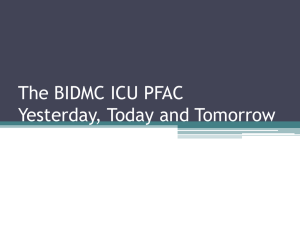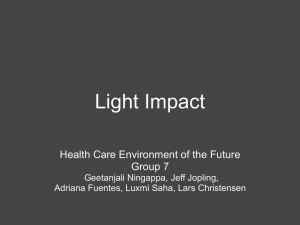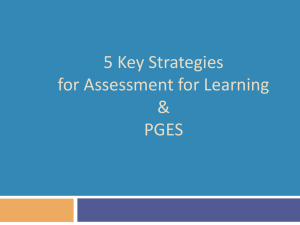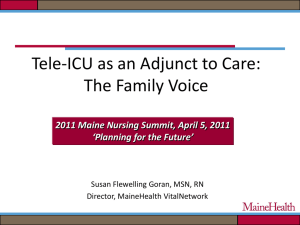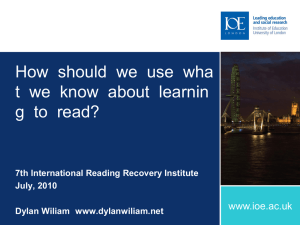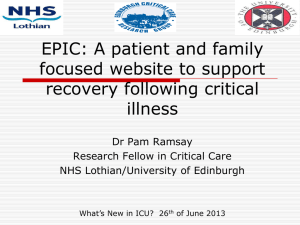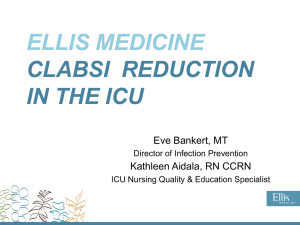Haematology & Critical Care
advertisement
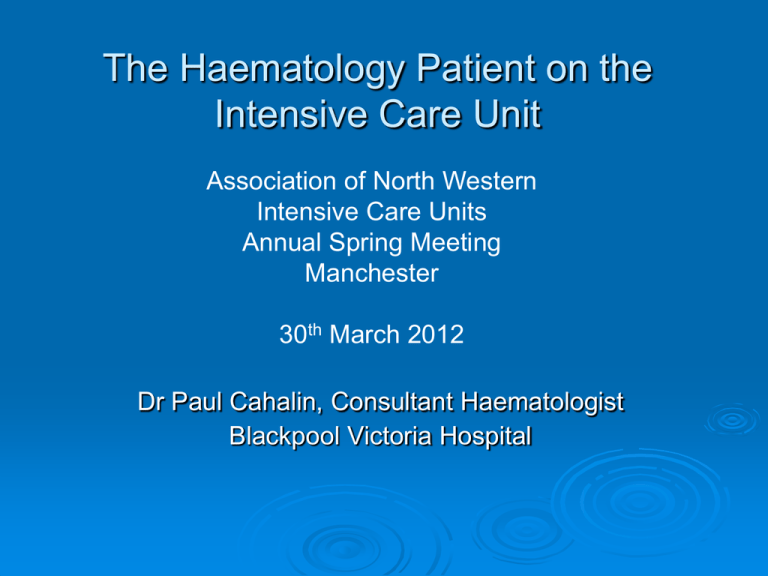
The Haematology Patient on the Intensive Care Unit Association of North Western Intensive Care Units Annual Spring Meeting Manchester 30th March 2012 Dr Paul Cahalin, Consultant Haematologist Blackpool Victoria Hospital Overview to talk Historical perspective Improvements Trial of ICU Publication issues Practical considerations Blackpool data Common threads…. They’re ‘different’ from other ICU patients’ ‘They’re young, we made them ill, so you need to do something’ ‘We’ve cured their malignancy, all you need to do is get them over this acute illness’ ‘Don’t worry, the marrow will recover within 2-3 days’ ‘Can we change that anti-fungal/antibiotic?’ ‘In fact, can we add a few more?!’ The Uninformed ICU Mantra… “Patients with haematological malignancies all come to ICU to die” “I’ll come & have a look, but there’s not much point – they all die anyway” Historical Perspective 1988: 13 out of 60 (21%) patients survived to hospital discharge. Higher mortality than other patient groups • Lloyd-Thomas et al BMJ 296: 1025 – 1029 1989: Only 1 of 40 patients with progressive pneumonia survived • Denardo Crit Care Med 17(1): 4-6 1991: An ethical look at intensive care for patients with malignancies • Chevrolet et al Eur J Cancer 27(2): 210-212 1993: BMT patients – only 1 of 28 patients ventilated survived ICU • Paz et al Chest 104:527 – 531 1995: “AML patients who require ventilatory support for acute respiratory failure rarely survive their ICU admission” • Tremblay et al Clin Invest Med 18(1): 19-24 Historical Perspective 1996: BMT centre in Seattle – “of the patients who required mechanical ventilation, no-one survived with lung injury combined with either haemodynamic instability” “However, survival after mechanical ventilation appeared to be improving” • Rubenfeld et al Annals Int Med 125(8): 625-633 • Rubenfeld et al Annals Int Med 125(8): 625-633 • Darmon et al – 2009:Curr Opin Oncol 21: 318-326 Progress in the 2000s….? 2004: German study – AML & pulmonary infiltrates requiring invasive ventilation. 87% died (26/30) – 4/10 survived <50 yrs old, but 0/20 if >50 years old But “prolonged ventilation does not preclude survival” • Rabe et al Journal Critical Care 19(1):29-35 Progress in the 2000s….? French retrospective study (n=83) in AML patients Mechanical ventilation in 57% ICU mortality 34% 49% of ICU survivors died within 1 year of ICU discharge Better survival if initially supported by NIV, than if initially supported by invasive ventilation ICU mortality rate : acute illness severity score 1 year survival : haematological prognostic factors ICU admission justified for selected patients with AML • Rabbat et al Brit Journal Haem 2005; vol 129: 350-357 Progress in the 2000s….? 2005: Dutch study – ICU outcome predicted by sequential organ failure assessment (SOFA) scores Cornet et al: 2005 – Eur J Haem: 74: 511-516 2002: French study: “Severity of the underlying hematologic malignancies does not influence intensive care unit or hospital mortality. Short-term prognosis is exclusively predicted by acute organ dysfunctions and by a pathogen’s aggressiveness. Therefore, reluctance to admit patients with non-terminal hematologic malignancies to the intensive care unit based only on the prognosis of their underlying hematologic malignancy does not seem justified.” Massion et al 2002 – Crit Care Med 30:2260 - 2270 Darmon et al – 2009:Curr Opin Oncol 21: 318-326 Progress in the 2000s….? 2005: Retrospective study from Australia over 10 year period (1989-1999) Improved mortality over time (1st vs 2nd 5 year period) Moran et al Anaesth Intensive Care 2005: 33(1): 26-35 2008: 90 acute leukaemia patients admitted 2001-2004 68% needed ventilatory support 27% patients survived to be discharged from hospital & were alive 2 months later A diagnosis of acute leukaemia should not disqualify patients from an ICU admission Thakkar et al Cancer 112 (10): 2233-2240 Progress in the 2000s….? 2009: Critically ill cancer patients – 3147 patients from 198 ICUs in 24 European countries ICU mortality rates No cancer – 23% Solid tumours – 27% Haematological malignancies – 58% “Patients with cancer on the ICU: the times they are changing” Taccone et al Critical Care 13(1):R15 Progress in the 2000s….? 2009: ICNARC data – 7689 admissions Admissions with haematological malignancies to 178 UK ICUs 1995 – 2007 7689 admissions ICU mortality 43% Acute hospital mortality 59% • Hampshire et al Critical Care 2009 : vol 13: R137 2012: Marsden data – specialist cancer ICU 52% mechanical ventilation ICU mortality 34% Hospital mortality 45% (assoc with MV & ≥2 organ failures) Neutropenia not predictive Bird et al Brit Jounal Anaesthesia 108(3):452-9 ICU Trial Lecuyer et al Crit Care Med 2007 vol 35(3): 808-814 ICU Trial Prospective study ICU trial: full treatment for 4 days – re-appraisal day 5 Criteria Remission or stable disease with scheduled intensification Good health status: prognosis unclear / not yet assessable Availability of potentially lifespan-extending cancer treatment No allogeneic transplants Patients 114 non-trial 188 given ICU trial – 85 died ≤5 days, 103 survived 1st 4 days ICU Trial Results: Linear relation on day 6: no of organ failures & mortality • Day 6 figures: 26% - 1 organ; 55% 2 organ failures, 85% with 5 organ failures From day 3 onwards, organ dysfunction score worse in non-survivors than in survivors All patients that required initiation of MV, vasopressors or dialysis after 3 days in the ICU died Getting worse (or staying the same) isn’t good… Dutch study from 2011 86 patients including allo-transplant patients Organ dysfunction scores (APACHE-II, SOFA) at ICU admission & days 1, 3, 5 & 7 Prognostic factors • Need for MV or inotropes • Deceasing SOFA score – better prognosis than if unchanged or increasing • “Unchanged or increasing SOFA scores still out-perform all other parameters as markers of an unfavourable prognosis.” “Unlimited treatment for a limited amount of time” Geerse et al Eur J Int Med 2011: 22: 57-61 Publication issues Haematology / ITU / general anaesthetic / general medical journals Mostly retrospective reports – bias Variation Case mix inc proportion of allo-transplants Severity of illness on ICU admission Degree & duration of organ support on ICU inc intubation rates Discharge criteria Timing of withdrawal of active treatment Hill et al (2012) – retrospective data from 5 ICUs in Yorkshire Effect of centre experience? Volume: No of patients with haematological malignancy & acute respiratory failure admitted to ICU per year Low - <12 per year Intermediate 12-30 per year High>30 per year Patients in high volume ICUs had lower mortality than other patients • Lecuyer et al Eur Resp Jour 2008: 32: 748 - 754 Early referral to ICU Improving pre-ICU care Early warning scores Access to senior clinicians Early goal-directed therapy Care bundles eg “Surviving Sepsis” campaign French study – outcome of cancer patients considered for ICU 26% “too sick” – but 17% alive at day 180 23% “too well” – but only 79% alive at 30 days ?need for a broader admission policy • Thiéry et al 2005 JCO 23: 4406-4413 Practical Considerations Blackpool experience Close collaboration between intensivists & haematologists Management discussions “in the cold light of day” Joint agreements on working Usually consultant to consultant referrals Daily ICU review by haematology team Who does what, to whom & when Morbidity & mortality meetings to include ICU admissions Outcome data 75 admissions since Jan 2009 Prospective data collection Mostly acute leukaemia & autologous SCT; no allos Organ dysfunction score not quantified 47/75 (63%) survive ICU 40/75 (53%) discharged from hospital 41 admissions with follow-up period >1 year 25/41 (61%) survive ICU 20/41 (49%) discharged from hospital 10/41 (24%) alive at 1 year post ICU discharge Sincere thanks to….. All the intensivists at Blackpool • Chris Clarke, Rob Downes, Rob Thompson, Jason Cupitt, Dan Kelly, Raj Nichani, Nigel Randall, Simon Vaughan Emma Morris, Consultant Haematologist at UCL for her presentation & preview of draft BCSH standards Thanks for your attention Discussion
